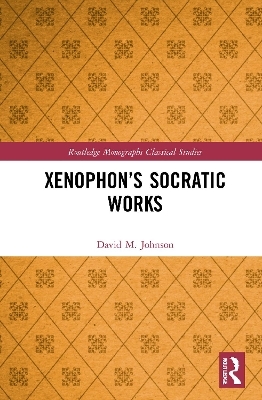
Xenophon’s Socratic Works
Seiten
2023
Routledge (Verlag)
978-0-367-76581-1 (ISBN)
Routledge (Verlag)
978-0-367-76581-1 (ISBN)
Xenophon’s Socratic Works demonstrates that Xenophon, a student of Socrates, military man, and man of letters, is an indispensable source for our understanding of the life and philosophy of Socrates.
David M. Johnson restores Xenophon’s most ambitious Socratic work, the Memorabilia (Socratic Recollections), to its original literary context, enabling readers to experience it as Xenophon’s original audience would have, rather than as a pale imitation of Platonic dialogue. He shows that the Memorabilia, together with Xenophon’s Apology, provides us with our best evidence for the trial of Socrates, and a comprehensive and convincing refutation of the historical charges against Socrates. Johnson’s account of Socrates’ moral psychology shows how Xenophon’s emphasis on control of the passions can be reconciled with the intellectualism normally attributed to Socrates. Chapters on Xenophon’s Symposium and Oeconomicus (Estate Manager) reveal how Xenophon used all the literary tools of Socratic dialogue to defend Socratic sexual morality (Symposium) and debate the merits and limits of conventional elite values (Oeconomicus). Throughout the book, Johnson argues that Xenophon’s portrait of Socrates is rich and coherent, and largely compatible with the better-known portrait of Socrates in Plato. Xenophon aimed not to provide a rival portrait of Socrates, Johnson shows, but to supplement and clarify what others had said about Socrates. Xenophon’s Socratic Works, thus, provides readers with a far firmer basis for reconstruction of the trial of Socrates, a key moment in the history of Athenian democracy, and for our understanding of Socrates’ seminal impact on Greek philosophy.
This volume introduces Xenophon’s Socratic works to a wide range of readers, from undergraduate students encountering Socrates or ancient philosophy for the first time to scholars with interests in Socrates or ancient philosophy more broadly. It is also an important resource for readers interested in Socratic dialogue as a literary form, the trial of Socrates, Greek sexual morality (the central topic of Xenophon’s Symposium), or Greek social history (for which the Oeconomicus is a key text).
David M. Johnson restores Xenophon’s most ambitious Socratic work, the Memorabilia (Socratic Recollections), to its original literary context, enabling readers to experience it as Xenophon’s original audience would have, rather than as a pale imitation of Platonic dialogue. He shows that the Memorabilia, together with Xenophon’s Apology, provides us with our best evidence for the trial of Socrates, and a comprehensive and convincing refutation of the historical charges against Socrates. Johnson’s account of Socrates’ moral psychology shows how Xenophon’s emphasis on control of the passions can be reconciled with the intellectualism normally attributed to Socrates. Chapters on Xenophon’s Symposium and Oeconomicus (Estate Manager) reveal how Xenophon used all the literary tools of Socratic dialogue to defend Socratic sexual morality (Symposium) and debate the merits and limits of conventional elite values (Oeconomicus). Throughout the book, Johnson argues that Xenophon’s portrait of Socrates is rich and coherent, and largely compatible with the better-known portrait of Socrates in Plato. Xenophon aimed not to provide a rival portrait of Socrates, Johnson shows, but to supplement and clarify what others had said about Socrates. Xenophon’s Socratic Works, thus, provides readers with a far firmer basis for reconstruction of the trial of Socrates, a key moment in the history of Athenian democracy, and for our understanding of Socrates’ seminal impact on Greek philosophy.
This volume introduces Xenophon’s Socratic works to a wide range of readers, from undergraduate students encountering Socrates or ancient philosophy for the first time to scholars with interests in Socrates or ancient philosophy more broadly. It is also an important resource for readers interested in Socratic dialogue as a literary form, the trial of Socrates, Greek sexual morality (the central topic of Xenophon’s Symposium), or Greek social history (for which the Oeconomicus is a key text).
David M. Johnson is an Associate Professor of Classics at Southern Illinois University Carbondale, USA. He is the author of Socrates and Alcibiades: Four Texts and Socrates and Athens; co-editor of Plato and Xenophon: Comparative Studies; and author of numerous articles on Xenophon’s Socrates.
1. Approaching the Memorabilia 2. Defending Socrates 3. Xenophon’s Apology 4. The Moral Psychology of Xenophon’s Socrates 5. Xenophon’s Symposium 6. Xenophon’s Oeconomicus
| Erscheinungsdatum | 05.05.2021 |
|---|---|
| Reihe/Serie | Routledge Monographs in Classical Studies |
| Zusatzinfo | 8 Tables, black and white; 1 Line drawings, black and white; 1 Illustrations, black and white |
| Verlagsort | London |
| Sprache | englisch |
| Maße | 156 x 234 mm |
| Gewicht | 453 g |
| Themenwelt | Geschichte ► Allgemeine Geschichte ► Vor- und Frühgeschichte |
| Geschichte ► Allgemeine Geschichte ► Altertum / Antike | |
| Geisteswissenschaften ► Philosophie ► Philosophie Altertum / Antike | |
| ISBN-10 | 0-367-76581-0 / 0367765810 |
| ISBN-13 | 978-0-367-76581-1 / 9780367765811 |
| Zustand | Neuware |
| Informationen gemäß Produktsicherheitsverordnung (GPSR) | |
| Haben Sie eine Frage zum Produkt? |
Mehr entdecken
aus dem Bereich
aus dem Bereich
Was Pompeji über uns erzählt
Buch | Hardcover (2023)
Propyläen (Verlag)
32,00 €
auf den Spuren der frühen Zivilisationen
Buch | Hardcover (2023)
C.H.Beck (Verlag)
20,00 €


